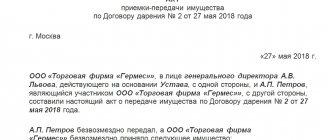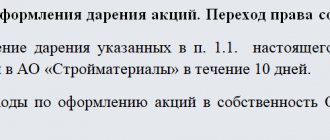Based on Art. 131 of the Civil Code of the Russian Federation, the procedure for donating real estate is always accompanied by subsequent state registration of rights to it. The procedure for this registration - the procedure for carrying it out, the necessary documents and other nuances are determined by Federal Law No. 122 of July 21, 1997, according to which it is carried out by the Federal Registration Service through its local branches and multifunctional centers.
According to Art. 11 Federal Law No. 122, for the commission of registration actions by the specified bodies in favor of the state, a state duty , the amount of which is determined by tax legislation, and the duty itself is payable before the submission of documents for registration. It is noteworthy that there is no , however, provision can be carried out on the personal initiative of the applicant.
Attention
Refusal to pay the state duty or lack of information about its payment in the state payment system (GIS GMP), according to Art. 16 Federal Law No. 122, entails non-acceptance for consideration of documents submitted for registration. The procedure established by the article provides for the return of submitted documents to the applicant after the expiration of a ten-day storage period if information about payment of the fee is not received.
It is worth understanding that not all legal entities are obligated to pay the duty . Thus, within the framework of the donation procedure, local government bodies, state bodies and bodies of the constituent entities of the federation, as well as the poor are exempt from such obligations (clause 15 of Article 333.35 of the Tax Code).
The amount of the state duty itself is determined by Art. 2,000 rubles for individuals 22,000 rubles for organizations . The applicant pays the fee for registration of rights by transferring funds to the account of a specific branch of Rosreestr in the treasury.
Registration of real estate donation agreement
As is known, from March 1, 2013, Federal Law No. 302 dated December 30, 2012 abolished the requirement for state registration of an agreement when concluding a real estate donation transaction. However, this law did not at all abolish the registration of real estate rights themselves , established as mandatory, according to Art. 131 Civil Code of the Russian Federation. In accordance with Federal Law No. 122 of July 21, 1997, it is carried out by the Federal Registration Service through its local branches and MFCs (multifunctional centers).
Before the adoption of the law abolishing the need to register a gift agreement, such an agreement received legal force only from the moment of its registration , but now - from the moment of signing . Well, the right of ownership, which is alienated by the donor, arises in the donee only after entering information into the appropriate register (clause 2 of Article 223 of the Civil Code).
Additionally
Since the moment of transfer of ownership is clearly determined by the moment of its registration, despite the conclusion of the gift agreement, the actual owner before registration is the donor .
The approximate procedure for conducting state registration is established by the legislator in Art. 13 Federal Law No. 122, according to which the registrar receives documents, registers them, checks them for legality, gives them a legal assessment and conducts a legal examination, after which he only enters the information into the Unified Register of Rights . At the same time, clause 1.2 of Art. 20 Federal Law No. 122 of July 21, 1997 determines the impossibility of recording a right in the register if the real estate cadastre does not contain information about the registered object.
The definition of state registration of rights as mandatory established an important rule for the form of the gift agreement. Thus, due to the need for registration, the form of the gift agreement must always be in writing , which is not required by Art. 574 of the Civil Code, which regulates this issue.
Example
A gift agreement was concluded between citizen Bulgakova and her daughter, according to which real estate, namely a country residential building, was alienated free of charge in favor of the latter. Having completed the donation transaction, the parties proceeded to prepare documents for registering the rights of the daughter of citizen Bulgakova to the specified item of donation. Having prepared the documents, they, however, forgot about the need to pay the state fee for recording rights in Rosreestr. Without attaching the appropriate payment document, Bulgakova’s daughter sent an application and a package of documents by mail to the local branch of the Federal Registration Service. The registration authority, having received the specified package of documents by mail and did not find in it any information regarding the payment of the state duty, in accordance with the requirements of Art. 16 Federal Law No. 122, did not accept the specified documents. He left them without consideration until he received confirmation of the payment of the registration tax from the applicant or the appearance of such information in the GIS GMP. After a week, the state registrar decided that the specified information would never be received and sent the specified package of documents back to the applicant. At the same time, the applicant - the daughter of citizen Bulgakova - remembered her mistake, and on the same day, when the registrar sent the documents to the applicant, she paid the state fee and submitted the payment document to the registration authority. Having discovered that the documents were sent back to her in violation of the specified procedure, she made a firm decision to appeal the actions of the registrar in court as soon as the mail delivered the sent documents.
In court, she asked to cancel the registrar's decision to return the documents to her and accept them immediately, and consider the date of payment of the state duty as the date of acceptance. She argued her position by saying that the registrar acted contrary to clause 4 of Art. 16 Federal Law No. 122, according to which he had the right to return documents to the applicant without accepting them for consideration, only after a ten-day period, not a seven-day period. Considering that after seven days she nevertheless paid the state fee and presented it to the registrar, this very day should have been the day the documents were accepted for consideration if the registrar had not violated the order.
Having considered the arguments of the daughter of citizen Bulgakova, the court satisfied her demands.
Who is required to pay the state fee
According to Art. 333.17 of the Tax Code of the Russian Federation, the obligation to pay a fee for registration of rights arises only for those individuals or organizations that apply for it to the Rosreestr authorities. Thus, the obligation to pay the state fee when registering rights is vested in the applicant - the person submitting the application for registration.
According to Art. 16 Federal Law No. 122, state registration of a right arising under a gift agreement is carried out at the request of the copyright holder (i.e., the donee) or the parties to the agreement under which the transfer of rights is carried out. Thus, the law allows the filing of this application from both sides - both from the donee and from the donor.
Based on the foregoing, the parties to the donation independently decide which of them will apply for registration of rights to real estate. The party that takes upon itself the obligation to submit an application for registration will have to pay the amount established by Art. 333.33 Tax Code state duty .
For your information
In addition to these parties, applicants may also be their authorized representatives . To do this, the party who is physically unable to submit an application is required to issue a power of attorney to the representative. In such cases, the obligation to pay the state duty is assigned to the party represented by the authorized representative.
In cases where the applicant is the donee, registration of the right will still require a statement from the donor, especially when concluding a consensual gift transaction. The logic of this provision is such that in order to determine the moment of transfer of rights in the future, a statement from the alienating party is necessary.
The law defines legal entities that are exempt from the need to pay state duty . Among them are state bodies and local governments, as well as the poor.
If several donors or donees apply to fix ownership rights, then the amount of tax is divided equally between all of them.
Prepare a deed of gift from a notary or yourself
The parties to the transaction may decide to have a notary accompany the donation transaction, which is not required by law, but is highly recommended, since by using the services of a professional, the risks of future conflicts with the participants and their heirs, which often end in litigation, can be reduced to almost zero. expenses and breach of contract.
ARTICLE RECOMMENDED FOR YOU:
Donation agreement to a budgetary institution in 2021 - current sample, errors, rules
When completing a transaction with a specialist, the cost of the deed of gift will depend not only on the estimated total value of the object of the donation, but also on the notary’s tariff, according to Article 22.1 of the “Fundamentals of the legislation of the Russian Federation on notaries.”
Amount of state duty
The amount of the state fee, which, when submitting documents for state registration of rights, is paid by the person submitting such documents, is determined by paragraphs. 22 clause 1 art. 333.33 Tax Code. According to it, before submitting an application for registration, the applicant - an individual must pay 2000 rubles ; applicant - legal entity - 22,000 rubles .
Separate tariffs are established for recording in the register of rights to land plots . For them, according to paragraphs. 24 clause 1 art. 333.33 Tax Code, the tariff is set at 350 rubles .
As has already been said, if there are several entities as applicants as right holders or alienators of property, the amount of the state duty is divided between them in equal parts . If one of these applicant entities, in accordance with Chapter 25.3 of the Tax Code of the Russian Federation, is exempt from paying it or is provided with benefits, then the amount of the fee is reduced in proportion to the number of beneficiaries among the applicants and is subject to payment by the remaining entities that are not exempt from paying it, in exactly the same amount.
Important
The amount of state duty paid by applicants if it is necessary to make changes to the state register and re-issue a certificate confirming the registration of the right. So, for physical for individuals it will be 350 rubles , for legal entities - 1 thousand rubles .
It is noteworthy that payment of the state duty is possible both in cash and non-cash form. The fact of payment of the state duty is confirmed either by a payment order with a bank mark (non-cash) or by a payment receipt.
Invalid transaction and penalties
Unscrupulous citizens, when drawing up a gift deed that disguises another transaction, should be prepared to pay a state fee for declaring the deed of gift invalid in court. The same applies to those persons who did not take into account all the rules established by law when drawing up the act or did not include certain non-obvious conditions in it.
Therefore, we recommend that you ask our experienced lawyers a free question and learn about all the intricacies and pitfalls of your particular situation in 5 minutes! Don't risk your future and the well-being of those close to you!
Based on a court decision on the invalidity of the gift agreement, in accordance with paragraph 1.1 333.19 of Article of the Tax Code of the Russian Federation, it will be necessary to pay:
- if the contract is declared invalid and the claim is recognized as less than 20,000 Russian rubles, the amount of the state duty will be approximately 400 rubles;
- when filing a claim in court for an amount less than 100,000 Russian rubles, the amount of state duty will be 800 rubles and 3% of the total transaction amount;
- if a deed of gift is declared invalid with an amount less than 200,000 Russian rubles, you will need to pay 3,200 Russian rubles and 2% of the amount specified in the agreement as a gift;
- if the court invalidated an agreement to donate an amount less than 1,000,000 Russian rubles, you will have to pay 5,200 Russian rubles and 1% of the total transaction amount as a state fee;
- in case of termination of a deed of gift drawn up for an amount exceeding 1,000,000 Russian rubles, the state duty will be 13,200 Russian rubles and 0.5% of the total transaction amount, but not more than 60,000 rubles.
ARTICLE RECOMMENDED FOR YOU:
Preliminary gift agreement: sample and how to draw it up
When challenging a deed of gift for an apartment, the state duty is calculated according to a similar principle after an expert assessment of the market value of the donated property!
You can learn more about challenging a transaction from this expert video:
Instead of an afterword
As you can see, the state duty for a gift agreement 2021 between relatives and strangers is a mandatory condition in most cases of alienation of property using the method in question. Considering the complexity of registration and many nuances, we recommend that you draw up a deed of gift through a notary, having first received a free consultation on our website !
Previous
Gift deed Donation agreement with a notary - cost in 2021
Next
Gift State registration of a gift agreement in Rosreestr
Procedure for paying state duty
By contacting one of the branches of Rosreestr for the purpose of registering the donee’s ownership of a property, in accordance with Art. 11 Federal Law No. 122, the applicant must pay a state registration fee . Despite the fact that this law does not establish the obligation to provide evidence of its payment, its provision is still advisable. This is due to the fact that most local branches of Rosreestr, despite the absence of a direct indication in the law, perceive the payment document as one of those necessary for state registration.
Thus, proof of the fact of payment of the state duty will be a genuine payment document - a payment order with a bank mark for non-cash payment and a bank check for cash payment. One of them is provided along with the rest of the documents required to register ownership of the property.
According to para. 4 paragraph 8 art. 16 Federal Law No. 122, if the payment document is not submitted along with the application and other documents for state registration, then the day of acceptance of such documents will be considered the day the specified authority receives information about such payment. Thus, the payment of the state fee must be made by the applicant before the submission of documents , however, the option of payment within 10 days from the date of submission .
Attention
Only individuals have the right to pay state fees in cash; for organizations, only non-cash payment is allowed.
If errors that will prevent the transfer of the tax amount to the budget system of the Russian Federation, according to paragraphs. 4 p. 4 art. 45 of the Tax Code, the obligation to pay the state duty should be considered unfulfilled , which is reported to the applicant, and it is also proposed to correct this state of affairs. At the same time , incorrectly filling out a document confirming payment of the fee, in accordance with Federal Law No. 122, may be an obstacle to registration, as a result of which it may be refused .
Payment of the state fee can also be made by an authorized representative of the applicant under a power of attorney, which such representative must have in hand upon payment. In such cases, the payment document must indicate that the representative is acting “on” and “in” the interests of a specific person - the applicant.
Let us note that evidence of the fact of payment of the state duty by the applicant can be not only the payment document , but also the information available in the GIS GMP .







